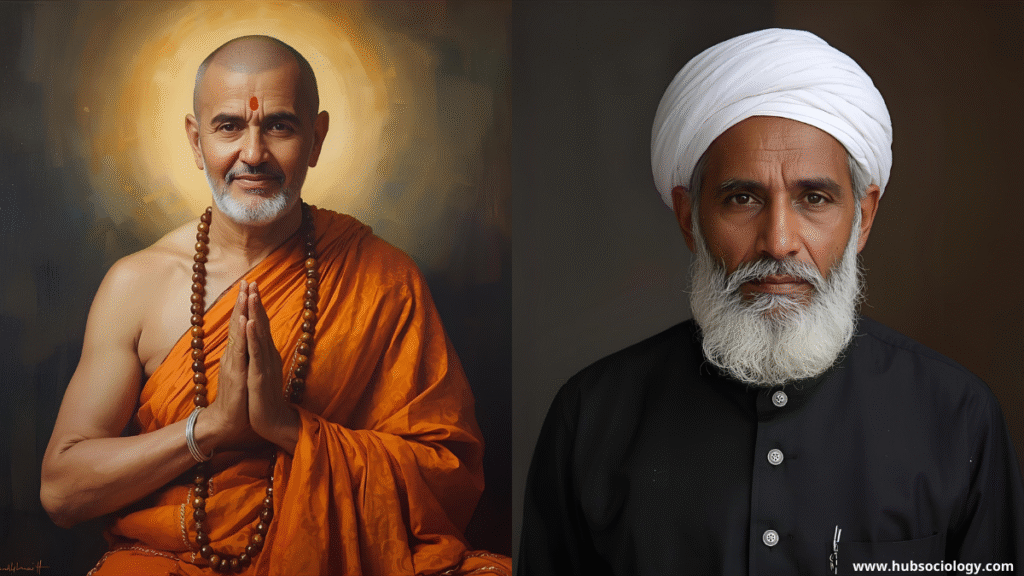Introduction on Weberian Approach
Religion has always been a central theme in sociology, shaping societies and influencing individual lives across history. Among the classical sociologists, Max Weber provided a distinctive approach to the study of religion, which differed from the earlier perspectives of Karl Marx and Émile Durkheim. While Marx viewed religion largely as an ideology tied to material conditions and Durkheim emphasized its social functions in maintaining solidarity,
Weber offered a nuanced, interpretive, and comparative framework. He examined religion as a force that not only reflected social structures but also actively shaped economic behavior, political authority, and cultural values. His study remains influential in the sociology of religion, particularly for its methodological depth and insights into the relationship between religion and modernity.

Table of Contents
Weber’s Methodological Orientation
Weber’s sociology was grounded in verstehen (interpretive understanding), which emphasized the need to grasp the subjective meanings individuals attach to their actions. Unlike positivist approaches that sought to explain religion in terms of external causes, Weber insisted that religion could only be understood by exploring the intentions, beliefs, and values of its adherents. This perspective helped him move beyond simplistic explanations and appreciate the diversity of religious systems across cultures.
Weber’s approach was also comparative and historical. He analyzed how different religions—such as Christianity, Hinduism, Buddhism, Confucianism, and Judaism—shaped the character of civilizations. His comparative method revealed how religious ideas contributed to varied trajectories of social and economic development in the East and the West.
Religion and the Spirit of Capitalism
Perhaps Weber’s most famous contribution to the sociology of religion is his thesis in “The Protestant Ethic and the Spirit of Capitalism” (1905). He argued that religious ideas, particularly those within Protestantism, had a profound influence on the rise of modern capitalism in Europe.
- Calvinist Doctrine of Predestination: Calvinism taught that salvation was preordained and beyond human control. This uncertainty created what Weber called an “inner loneliness” among believers. To cope with this anxiety, Calvinists looked for signs of being among the elect. Success in worldly calling was interpreted as evidence of divine favor.
- Ascetic Work Ethic: Protestant sects, especially Calvinists and Puritans, emphasized disciplined labor, frugality, and avoidance of luxury. This rationalized lifestyle encouraged systematic work and reinvestment of profits rather than indulgence in consumption.
- Rationalization of Economic Life: The religious ethic fostered a spirit of rational calculation, efficiency, and organization in economic activity. Over time, these values detached from their religious origins and laid the cultural foundation of modern capitalism.
Weber did not claim that religion alone caused capitalism; rather, he saw it as one of the cultural preconditions interacting with political and economic factors. This nuanced argument highlighted the causal significance of religious ideas in shaping large-scale social transformations.
Comparative Analysis of World Religions
Weber extended his analysis beyond Christianity to other world religions, attempting to explain why modern capitalism developed uniquely in the West. His comparative studies included:
- Confucianism and Taoism (China): Confucian ethics emphasized harmony, adaptation to tradition, and respect for authority. Unlike Protestant asceticism, it encouraged moderation rather than radical transformation of the world. This orientation discouraged the systematic pursuit of profit and innovation.
- Hinduism and Buddhism (India): Weber observed that Hindu beliefs in karma, caste hierarchy, and spiritual liberation through detachment reduced the motivation for worldly asceticism. Buddhism, with its emphasis on renunciation, also did not generate the kind of rationalized economic activity seen in Protestant Europe.
- Judaism: Weber acknowledged Judaism’s role in shaping Western rationality through its emphasis on law, ethics, and a rationalized relationship with God. However, its minority status and external constraints limited its role in fostering capitalism.
Through these comparisons, Weber illustrated how religious worldviews influenced economic ethics and orientations toward life. His central argument was not that non-Western religions were inferior but that they offered different cultural logics that shaped distinct historical paths.
Religion and Authority
Another major contribution of Weber’s approach was his exploration of the relationship between religion and political authority. In his theory of legitimate domination, Weber identified three types of authority:
- Traditional Authority: Rooted in customs and established beliefs, often supported by religious traditions.
- Charismatic Authority: Based on the extraordinary personal qualities of religious leaders, such as prophets or reformers. Examples include Jesus, Muhammad, and Buddha.
- Legal-Rational Authority: Based on formal rules and institutions, characteristic of modern bureaucratic states.
Weber emphasized how charismatic religious leaders could disrupt traditional authority and inspire radical social change. Over time, however, charisma tended to become routinized, institutionalizing into formal religious organizations and doctrines. This process illustrated how religion could be both a revolutionary force and a stabilizing institution.

Rationalization and Disenchantment on Weberian Approach
One of Weber’s most profound ideas about religion was its role in the broader process of rationalization—the increasing dominance of calculation, efficiency, and formal rules in modern society. Religion, paradoxically, contributed to rationalization by promoting disciplined conduct and systematic worldviews.
Yet rationalization also led to what Weber called the “disenchantment of the world.” In traditional societies, religion infused life with mystery and sacred meaning. Modernity, shaped by science, bureaucracy, and secularization, stripped the world of transcendence, leaving individuals in an “iron cage” of rationality. Thus, religion’s historical role was double-edged: it provided meaning and motivation, but also prepared the way for a secular, disenchanted modern order.
Weberian Approach in Sociological Perspective
Weber’s approach to religion remains significant for several reasons:
- Multi-Dimensional View: Unlike Marx, who reduced religion to class ideology, Weber recognized it as an autonomous sphere of culture with its own internal logic and causal power.
- Subjective Understanding: His emphasis on meanings and motivations deepened the sociological analysis of religious behavior.
- Historical and Comparative Insight: Weber demonstrated how religious traditions influenced diverse civilizational outcomes.
- Linking Micro and Macro: He connected individual piety (micro-level) to large-scale structures like capitalism and bureaucracy (macro-level).
Critiques of Weber’s Approach
Despite its enduring influence, Weber’s approach has faced criticism:
- Eurocentric Bias: Critics argue that his framework privileged Protestantism and overlooked the economic dynamism of other civilizations, such as Islamic societies.
- Overemphasis on Ideas: Some suggest Weber gave too much weight to religious ideas while underestimating material and structural factors.
- Historical Debates: Economic historians have questioned whether Protestantism was truly decisive in the rise of capitalism, pointing instead to technological and political developments.
Nevertheless, these critiques have spurred further research, keeping Weber’s ideas alive in contemporary sociology.
Conclusion on Weberian Approach
The Weberian approach to the study of religion stands out as a nuanced, interpretive, and historically rich framework in sociology. By linking religious ideas with economic behavior, political authority, and cultural transformation, Weber highlighted the profound ways in which religion shapes social life. His insights into the Protestant ethic, comparative religions, charisma, and rationalization remain cornerstones of sociological thought.

Even today, Weber challenges us to think critically about the role of religion in modern societies—whether as a source of meaning in a disenchanted world or as a cultural force influencing economic and political trajectories. In this sense, the Weberian perspective continues to illuminate the complex interplay between faith, society, and modernity.
Do you like this this Article ? You Can follow as on :-
Facebook – https://www.facebook.com/hubsociology
Whatsapp Channel – https://whatsapp.com/channel/0029Vb6D8vGKWEKpJpu5QP0O
Gmail – hubsociology@gmail.com
Topic Related Questions on Weberian Approach
5 Marks Questions on Weberian Approach (Short Answer Type)
- Define Max Weber’s concept of verstehen in the study of religion.
- What is meant by the “Protestant Ethic” according to Weber?
- Mention any two differences between Weber’s and Marx’s approaches to religion.
- What does Weber mean by the “disenchantment of the world”?
- Give two examples of charismatic religious leaders discussed by Weber.
10 Marks Questions on Weberian Approach (Medium Answer Type)
- Explain Weber’s thesis on the relationship between Protestantism and the rise of capitalism.
- Discuss Weber’s typology of authority and its relevance to religion.
- How did Weber compare the role of Hinduism and Confucianism in shaping economic life?
- Examine the importance of subjective meaning in Weber’s sociology of religion.
- Discuss the process of “routinization of charisma” in religious organizations.
15 Marks Questions on Weberian Approach (Long Answer / Essay Type)
- Critically evaluate Weber’s Protestant Ethic and the Spirit of Capitalism thesis with reference to its strengths and criticisms.
- Compare and contrast Weber’s analysis of Western and Eastern religions in shaping societal development.
- Explain Weber’s view on the role of religion in the process of rationalization and the “iron cage” of modernity.
- Discuss the methodological significance of Weber’s interpretive approach (verstehen) in studying religion sociologically.
- Evaluate the Weberian approach to religion in comparison with Durkheim and Marx.
